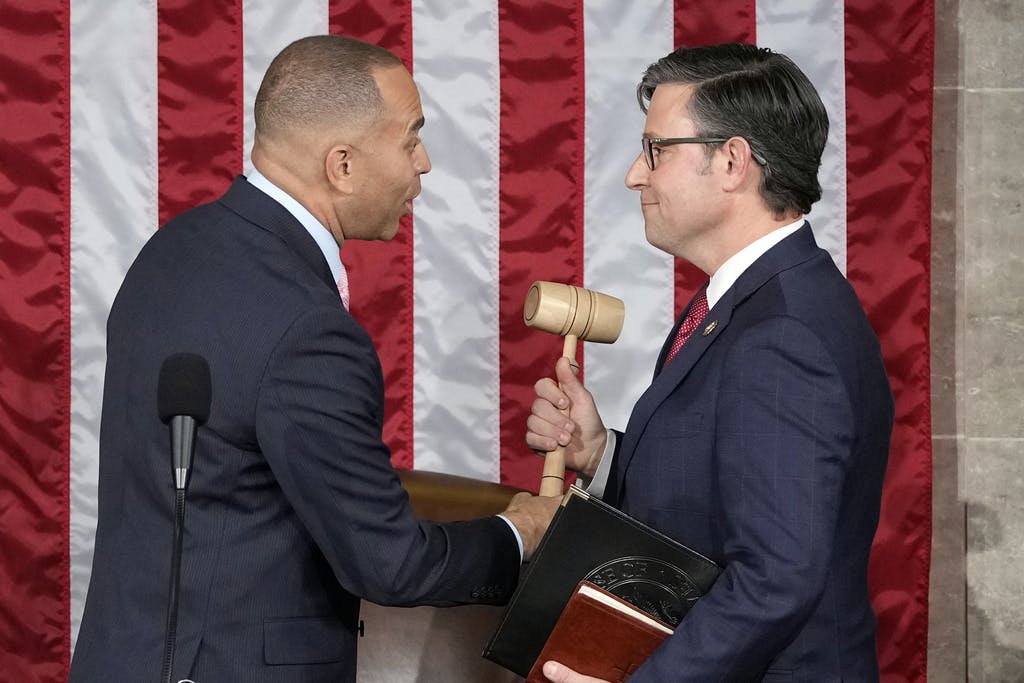Welcome to Washington: The First Co-Speakership
Speaker Johnson may have the top job, but the recent passage of the foreign aid bill proves that Congressman Hakeem Jeffries wields more power than any minority leader in recent memory.

Speaker Johnson has finally come to the realization that he cannot be a conservative leader in this moment, but rather the more important member of a power-sharing relationship. That realization could prove critical to keeping his job.
On Saturday, the House passed a $95 billion foreign aid package with money for Ukraine, Israel, and Free China, as well as legislation to force a TikTok divestment and the seizure of Russian assets. The measure passed the Senate Tuesday night.
A motion to vacate constantly loomed over the Speaker’s head, especially since passing a government funding bill in March and a reauthorization of warrantless surveillance programs just this month.
The threats poured in after he released the text of the aid bill, yet he held his ground, ushering in what could now be called the Era of the Co-Speakership.
Mr. Johnson has always had a working relationship with Democrats. Congressman Troy Carter, an influential Black Caucus member from Louisiana, told me in October that he was hoping to work with his old friend.
“He’s a good man, and we go way back,” he told me. They once served together in the Louisiana legislature. “I’ll always try to work with him when I can, because I know he’s a man of good conscience and strong principles,” he continued.
Mr. Carter and some Republicans were certainly relieved when the speaker had the guts to fight back. Standing up to the right wing of the conference won him many accolades.
“He’s leading,” Congressman Max Miller, who for months was frustrated by the lack of action on foreign aid, tells the Sun. “It was always the only way you were going to get this done. There’s no other way.”
That new chapter begins with the Speaker’s unlikely alliance with the minority leader, Hakeem Jeffries. The Brooklynite delivered a unanimous vote for Ukraine among Democrats, and suffered few defections on the other votes. If that is any sign of how the leader plans to defend the integrity of the speaker’s chair, then Mr. Johnson has little to worry about when he is met with a motion to vacate.
Mr. Jeffries won’t do it for nothing, however. He won’t get his bill to codify abortion rights or endless pork barrel spending for projects in Brooklyn. Mr. Jeffries could, however, demand an end to the impeachment inquiry that is likely going nowhere, or even additional foreign aid before the election.
In return, Mr. Johnson at least will get to hold on to the gavel thanks to Mr. Jeffries allowing his members to vote against a motion to vacate the chair — something the leader never did for Speaker McCarthy.
While Mr. Johnson controls the floor and what will be brought up for a vote, it’s Mr. Jeffries who commands the votes necessary to allow the House — and government itself — to function.
How will this co-speakership will work? On Thursday, Democrats emerged from a meeting and were asked by reporters if they would support Mr. Johnson’s proposal. Many said they were not sure how they would vote.
One member decided to be more honest. “Ignore the members who are saying what they may or may not do — they just want their names in the press, but the reality is no one would have the guts to go against Hakeem on this stuff and Hakeem hasn’t made any decisions yet,” the lawmaker told Punchbowl News.
Mr. Jeffries’ decision to back up his political rival speaks not only to his own commitments to America’s national security, but to Mr. Johnson’s inherent trust. The speaker knew the bills would never pass on a party-line Republican vote, and knew that some on the right would come for him.
But he also knew that Mr. Jeffries could be counted on.
As Congress prepares for what is likely to be a contentious budget season in the lead-up to the presidential election, Mr. Johnson could be leaning on his unlikely ally for passing bipartisan spending bills and more foreign aid proposals — not only for the sake of keeping Republican infighting out of the headlines, but to make Congress seem at least somewhat operational before vulnerable incumbents face their voters.

